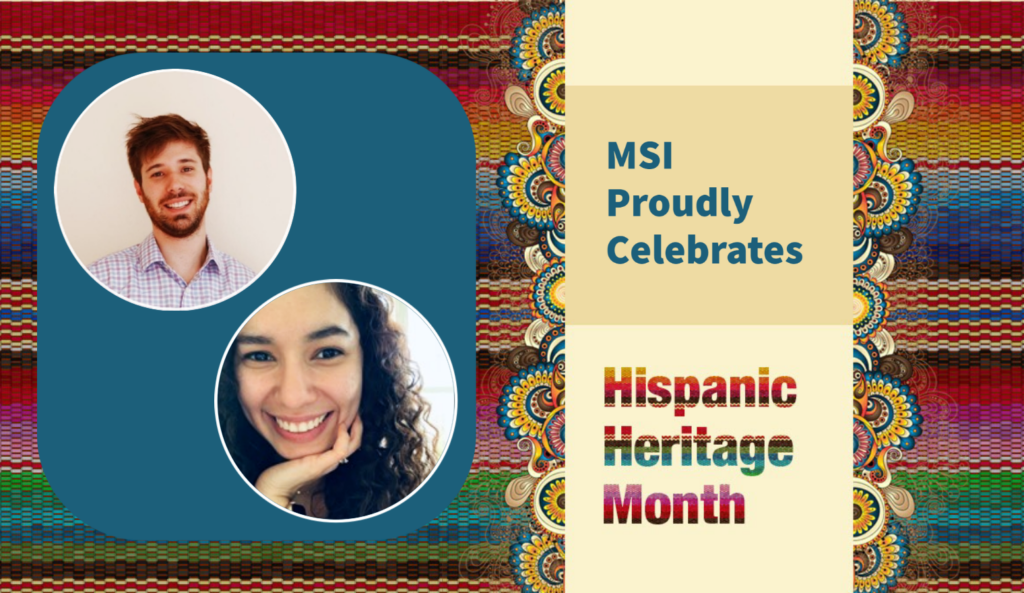National Hispanic Heritage Month is observed annually from September 15 to October 15 in the United States to celebrate the histories, cultures and contributions of American residents whose ancestors came from Spain, Mexico, the Caribbean and Central and South America.
September 15th is the starting day for the month as it marks Independence Day for Costa Rica, El Salvador, Guatemala, Honduras and Nicaragua. Independence Day for Mexico (September 16th) and Chile (September 18th) follow shortly after.
MSI is pleased to participate in this celebration and recognizes the important contributions of our Hispanic colleagues. To begin the month’s festivities, we asked two of our colleagues, Matias Rocchia Francone, Senior Recruiter, and Dilia Wells, Project Manager, to share their reflections on how their Hispanic culture has shaped their career, what challenges they have faced, and what advice they would provide to younger Hispanic professionals beginning their careers.

How has your cultural background guided/assisted you in your professional journey?
Rocchia Francone: It has allowed me to view issues and engage with individuals from around the world, applying different perspectives to understand their priorities, career, and life goals through another cultural lens.
Wells: It has given me a different perspective on how to approach issues. When I am dealing with a problem, I can look at it through two different cultural lenses to find the best solutions. Also, my cultural background has especially been beneficial when interacting with staff from different countries where MSI operates.
What were your biggest challenges throughout your career and how did they shape you?
Rocchia Francone: Learning how to coordinate with various individuals from different backgrounds, cultures, and countries with different personal and work priorities. It made me try to be as unbiased as possible and place myself in others’ shoes to understand where they are coming from and to better understand their priorities and through that find a solution.
Wells: My biggest challenge was coming to a new country, especially in such a competitive area such as the DMV (Washington Metropolitan Area). I felt I had to work twice as hard to prove myself, even at an entry-level job.
How does your cultural background shape your leadership style?
Rocchia Francone: I think it allows me to better understand where others are coming from and really listen to them, level and also be informal when appropriate.
Wells: My cultural background has shaped my leadership style to be more collaborative and focused on establishing and nurturing relationships. We, Hispanics, are people/team-driven and we care about one another to a point we consider the people we work with a family.
What’s the best piece of advice you’ve received?
Rocchia Francone: Hay que ser señor antes que doctor (You have to be a gentleman before a doctor).
Wells: Listen more than you speak.
What advice would you provide to younger Hispanic professionals starting in their careers?
Rocchia Francone: Lean on your background. It gives you another perspective and makes you unique to solve problems in different ways. Be yourself, don’t lose sight of who you are and your roots. Harness that!
Wells: Don’t be shy to take credit for your professional achievements. As Hispanics, we tend to be people and community-oriented, and sometimes we see taking credit as something negative. Believe me, it is not! Also, always be proud of being Hispanic!
MSI’s wellness and Hispanic Heritage Month committees have coordinated a series of National Hispanic Heritage Month activities to celebrate this year. These activities will provide staff an opportunity to engage with one another and learn about different Hispanic historical and cultural influences. Activities include a presentation from San Simon Caporales about the history of Bolivia’s iconic dances as well as a short dance class, a panel discussion with MSI colleagues who are members of the Hispanic community, and a Jeopardy – Mexico Edition game to test knowledge of Mexican history and culture.